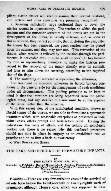NEONATOLOGY ON THE WEB
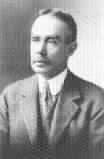
|
The Care and Feeding of Premature Infants
By John Lovett Morse, A.M., M.D., Instructor in Pediatrics, Harvard Medical
School, Assistant Physician at the Children's Hospital and the Infants'
Hospital, and Visiting Physician to the Floating Hospital, Boston.
Read before the Washington Gynecological and Obstetrical Society,
January 20, 1905. Published in the American Journal of Obstetrics and Diseases
of Women and Children 4:589-599, 1905.
|
Viability. -- There are very few authentic cases of the survival of
infants born before the twenty-seventh or twenty-eight week of pregnancy,
although Home's case, which was supposed to have been born in the eighteenth
week, was alive and well at nine years. Very few survive any length of time if
the weight is under two pounds or the length less than thirteen inches.
Oberwarth recently reported a case, and collected seven others from literature,
however, in which the weight was less than two pounds, which lived months or
years. Home's case, just referred to, measured but eight inches. It is not of
much practical importance, except for medicolegal reasons, however, to know the
exact age of the premature infant. No matter how young it is, how little its
weight and length, or how poor its prospects of survival, it should always be
treated as if its chances for life were of the best.
Development. -- The premature baby is not merely a small baby; it is an
undeveloped baby. It is not ready to be born or to live under extrauterine
conditions. The younger it is, the less developed it is and the less prepared to
struggle against the abnormal conditions in which it is placed. It is intended
to float in warm water of a constant temperature; it has, instead, to be handled
and exposed to air of all degrees of temperature. Its circulation is compelled
to change from the fetal to the adult form months before it is ready for the
change. It is compelled to breathe air into lungs only partially ready for use
with an undeveloped thorax and respiratory muscles. It is obliged to use
digestive organs only partially completed, instead of obtaining nourishment
already prepared through the circulation. In short, it is not prepared for an
independent existence, and has to depend for its life on organs only partially
ready to perform their functions. The more these facts are appreciated the more
care and attention will be given to these infants.
In a general way, all the peculiarities and weaknesses of the infant at term
are exaggerated in the premature infant. Certain points in their development
are, however, worthy of more detailed consideration. The lungs at full term are
poorly enough fitted for use; they are even less so before term. They contain
comparatively little alveolar structure and on account of the loose attachment
of the blood vessels are very prone to congestion and inflammation. The pulse
and respiration are irregular in rhythm, partly from lack of nervous control and
partly because of the underdeveloped condition of the organs and muscles
concerned.
The capacity of the stomach is limited, ranging from 5 c.c. to 20 c.c.,
according to the age and size of the individual infant. All the functions of
digestion are feeble, that for sugar being more developed than those for fat and
proteids. The amylolytic function is practically non-existent. Premature infants
should not, therefore, be given starch in any form.
The function of the sweat glands is not developed at full term, and hence is
not, of course, in premature infants. The premature infant is thus deprived of
one of the most important ways of losing heat. High external temperatures are,
therefore, extremely dangerous for them, and may comparatively easily cause a
heat stroke. The following chart shows very well the effect of excessive heat on
a premature infant whose nurse allowed the temperature of the incubator to go
too high.
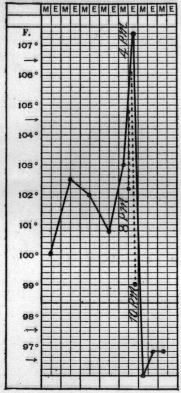
Figure: Temperature chart.
Animal Heat. -- On account of their small size, the surface area of
premature infants is proportionately larger than that of full term babies. Their
heat regulatory centers are, moreover, poorly developed. Consequently they lose
heat very rapidly. They cannot, therefore, bear low temperatures or exposure.
They must be protected in every way against cold and exposure. The importance of
this protection can hardly be exaggerated. It is perfectly possible for a single
slight chill to turn the scale from life to death and undo the labors of weeks
or months. On account of their greater loss of heat, premature babies need
relatively more food; that is, more calories per kilo than full term infants.
Experiments show that they require from one-fifth to one-quarter more calories
per kilo than do normal infants. In spite of their greater need for food, they
are, however, less able to take and digest it. This illustrates very forcibly
the disadvantages under which they labor.
Resistance to Infection. -- The resistance to infection of premature
babies is, for manv reasons, very slight. Their respiration is feeble, their
digestion imperfect, their tissues undeveloped, and their vitality low.
Care of Premature Infants. -- There are two objects to be attained
in the care of premature infants. The first of these is to keep the baby alive;
the second to develop its organism to the stage normally reached at full term.
The second of these is often forgotten, but is almost as important as the first.
The two most important points in the care of premature infants are the
maintenance of the animal heat and the provision of a suitable food. It is
unquestionably of advantage to protect them from noises, bright lights and
handling, because in this way the normal intrauterine conditions are more nearly
approached, but the importance of all these measures is infinitely less than the
maintenance of the animal heat and the provision of a suitable food. Premature
babies must be left alone and not handled. Handling cannot possibly do them any
good and is almost certain to do them harm. They should not be picked up or
disturbed in any way. Premature babies should not be regarded as curios and
shown to everyone who happens to come along. Every person that sees them
disturbs them to some extent and increases the chances of exposure and the
dangers of infection. No one but the immediate family should be allowed to see
them, and they should be allowed but one look.
Maintenance of Animal Heat. -- While attempting to keep up the
infant's animal heat, it must not be forgotten that both fresh air and pure air
are necessary for its well being. It cannot thrive on air which has lost its
oxygen and it will be infected by bacteria-laden air even if it is kept warm.
There are two means by the use of which the animal heat may be kept up. These
are incubators and substitutes for incubators.
Incubators. -- The ideal incubator is one which will maintain anv
temperature desired constantly, and at the same time provide a sufficient supply
of pure, fresh, warm air. I have never seen one which will do this. Most of them
will maintain a constant temperature, or can be made to do so. None of them
provides a sufficient supply of pure, fresh, warm air. None of them can do so
unless some better system of ventilation is provided than has been up to the
present time. Such a system would, moreover, probably be applicable only in
hospitals. One result of the lack of fresh air is a diminution in the baby's
vitality and in its resistance to infection. Bacteria grow most luxuriantly at
the temperature at which the incubator is kept, so that another result of the
lack of fresh air is an increased liability to infection. My experience leads me
to believe, moreover, that premature infants do better if they have air to
breathe of a slightly lower temperature than that at which the air of the
incubator is kept. Personally, therefore, I prefer, at any rate in private
practice, some substitute for an incubator to the incubator itself.
The best and most available substitutes for the incubator are the padded
crib or basket. If a crib is used, it must be a small one. An oval
clothes-basket is very satisfactory. The bottom and sides of the crib, or
basket, must be padded thickly with cotton. The top should be covered with a
blanket which reaches to a little below the baby's neck. The temperature of the
baby's immediate surroundings can be kept at any temperature desired by the
judicious use of hot water bottles or bags. This temperature should be between
95° F. and 90° F. The temperature should be taken from a thermometer
which is wrapped in the baby's clothing and not from one hung in the crib. The
dangers of over-heating and of chilling have already been mentioned. Both can be
to a certain extent guarded against by the regular observation of the infant's
rectal temperature. The temperature of the room should be kept between 85°
F. and 80° F., thus giving the baby air to breathe of a somewhat lower
temperature than that of its immediate surroundings. The infant should be kept
in a room by itself. The room should be sunny and have an open fireplace with a
fire in it. The crib should be protected from draughts by screens. If it is
possible to do so without getting the temperature too low, the window should be
open.
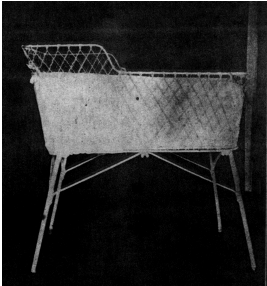
Figure: Padded Crib.
Other important methods of keeping up the animal heat are those which
prevent the loss of heat. Most of these methods have an additional advantage in
that they prevent handling. The baby should not be bathed, not even at birth. It
should be oiled with olive oil then and every two or three days afterward. This
gradually cleans it and keeps the skin in good condition. It should be oiled in
its crib, not in the nurse's lap. It should not be dressed, but should be
wrapped in absorbent cotton, or better, in a quilted gown with a hood. The gown
is made by quilting cotton between two layers of cheese-cloth. This protects the
baby as well as cotton alone, and makes the care much easier. A diaper may be
used in fairly strong babies; absorbent cotton makes a satisfactory substitute
in the feeble.
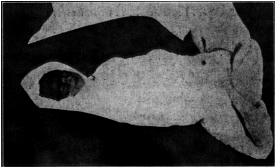
Figure: Infant in gown.
Feeding. -- The best food for premature babies is human breast-milk.
All the reasons which make breast-milk the best food for full-term babies are
doubly applicable in the case of premature infants. If much premature, they
cannot be put to the breast because of the consequent exposure and handling.
Very feeble babies are, moreover, unable to suck. In some cases the nurse can
lean over the crib and thus put the nipple in the baby's mouth. In many cases,
however, the milk must for a time be taken with a breast-pump and fed in some
other way. Many premature infants, in fact most in the beginning, are unable to
digest full-strength breast-milk. It is safer, therefore, at any rate at first,
to dilute the breast-milk with water, in the proportion of two or three parts of
water to one of milk. A small amount of milk sugar may or may not be added.
Premature infants usually do better on milk two weeks or more old than on the
colostrum. In the beginning, therefore, the milk of a wet-nurse is better than
that of the mother.
The most suitable food, if breast-milk cannot be obtained, is some
modification of cow's milk. Whey mixtures are better than ordinary mixtures,
because the proteids are in a more easily digestible form, and hence throw less
work on the feeble digestive organs. Very weak mixtures should be used at first.
If the baby is not satisfied, it is very easy to increase the strength of the
mixture. If too strong a mixture is given in the beginning, it may kill the
baby, and will certainly cause disturbances of digestion which will require days
or weeks to correct. It is never a mistake to give too weak a mixture in the
beginning, even if for a time it has to be strengthened every day or two.
The following mixtures are suitable ones. It is never a mistake to begin
with the weakest one. Strong babies and those near full-term may, however, take
the stronger ones at once without harm.
| Mixture 1 | Mixture 2 | Mixture 3 |
| Fat | 1.00 | 1.50 | 2.00 |
| Sugar | 3.00 |
4.00 | 5.00 |
| Total
Proteids | 0.25 | 0.25 | 0.50 |
It is better to split the proteids in all these formulas by using whey
mixtures, making the lactalbumen and caseinogen the same. These formulae,
unfortunately, cannot be made with gravity cream, as a cream containing at least
32 per cent. of fat is needed. They must, therefore, be prepared at a laboratory
or with a high-percentage cream. Five per cent. of lime water should be added
and the mixture pasteurized at 155° F.
It is better to begin by giving 5 c.c. at a feeding. If the baby is not
satisfied, it is very easy to gradually increase the amount. No harm can be done
bv giving too little at first; irreparable harm may be done by giving too much.
It is rarely advisable to feed a premature infant as often as once an hour,
as this gives it almost no time for rest or sleep. The best interval in the
beginning is usually 1 1/2 hours. The food should be given at this interval both
day and night, making sixteen feedings in 24 hours. This interval should be
lengthened to two hours as soon as possible. Feeding should be commenced as soon
as the food can be prepared, that is, within a few hours after birth.
When the infant is strong enough to take food from a nipple, it should be
fed from the bottle. Many babies are not strong enough to do this, however, and
have to be fed in some other way. The most satisfactory way of feeding such
babies is with the "Breck Feeder," designed by Dr. Samuel Breck, one
of the physicians to the Boston Floating Hospital. It consists essentially of a
graduated glass tube open at both ends. On the smaller end is a nipple about the
size of the rubber of a medicine dropper. This is perforated and goes into the
baby's mouth. On the other end is a large rubber finger-cot. By squeezing the
finger-cot milk is forced into the baby's mouth and efforts at sucking aided or
induced. Some babies are too feeble to take food even in this way and have to be
fed with a dropper. It is almost never advisable to use a stomach tube, as the
shock of passing it usually does more harm than the food does good.

Figure: The "Breck" Feeder.
Stimulation in the form of brandy in doses of 1 or 2 drops, or of strychnia
in doses of 1-1000 of a grain, is often necessary for a long time. Oxygen is
very useful when there is cyanosis, and will sometimes carry babies through very
critical periods. It is always well to have oxygen close at hand. Babies who
have a plentiful supply of fresh air rarely need it, however.
Nursing. -- It is evident from what has been said that it will
require the whole time of two able-bodied women to care for and feed one
premature infant. No one person can do it properly, as the constant attention
and frequent feedings never allow more than an hour of consecutive sleep, and
usually much less. Everything depends on the care and watchfulness of the
attendants. Their position is a far more important one than that of the
physician. Trained nurses are much preferable to unskilled attendants,
especially if they have been trained in the care and feeding of infants.
I realize, of course, that I am describing ideal conditions which can only
be attained when people are well-to-do and do not have to spare expense. There
is no reason, however, why they should not be kept as an ideal in other cases in
which the circumstances are less favorable, and approached as nearly as
possible. When everything can be done, regardless of expense, I think premature
babies do much better in their own homes than in a hospital. They receive more
individual attention and are much less exposed to infection. For the same
reasons I prefer even only moderately good surroundings at home to those of a
hospital.
Prognosis. -- The prognosis depends chiefly on the age and weight of
the infant and the care which it receives. The older the infant, the better the
prognosis. Every day counts. There is, of course, nothing in the old saying that
seven months' babies are more likely to survive than eight months' babies. It
probably originated in the fact that seven months' babies were glven special
care, while eight months' babies were treated in the same way as those born at
full term. The prognosis is almost absolutely bad when the weight is under two
pounds. It is very fair when it is over four pounds. Every ounce of weight over
two pounds increases the chances of survival. The importance of care and of
attention to the minutest details of the treatment has already been mentioned.
Too much stress cannot be laid upon it.
Premature infants that are doing well usually run a slightly elevated
temperature; those that are doing badly almost always run a subnormal
temperature. A drop in the temperature should always be regarded as a sign of
danger, even if all other conditions seem favorable. Premature infants that are
apparently doing well in other ways often go many weeks without any gain in
weight. This is not a cause for discouragement, because during this time they
are almost always gaining steadily in development and approaching the status of
the normal full-term infant. We should be satisfied, for the time, if we are
developing a normal baby; it is easy enough to make it gain later.
Premature babies are very apt to die suddenly without any apparent cause. It
is never safe to consider them out of danger until they are thriving under
normal conditions. Up to this time the prognosis should always be guarded. If
they survive, they become as vigorous and as large adults as do full-term
babies.
Created 1/2/96 / Last modified 7/19/97
Copyright © 1998 Neonatology on the Web / webmaster@neonatology.net

